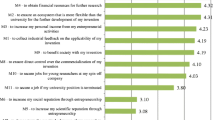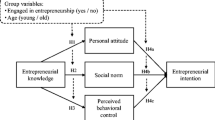Abstract
This article is based on the adaptation of Ajzen’s theory of planned behavior (TPB) to build an entrepreneurial intention framework tailored to the specific context of researchers involved in eco-label industry, who can be perceived as nascent entrepreneurs. The entrepreneurial intention model is tested on a convenience sample of researchers involved in eco-label industry from a wide range of countries. The configurational effect of research experience, personal attitude, funding instruments and entrepreneurial education level is tested for causal condition related to entrepreneurial intention of 25 eco-label researchers. The qualitative approach of data reveals that research experience and personal attitude relate positively to entrepreneurial career intentions and that these relationships are mediated by entrepreneurial education level. A multi-sided online platform connecting innovators and potential investors is considered a suitable solution for funding respondents’ results of research and innovation activities. Stimulating entrepreneurial motivations and intentions may help researchers to better adapt to alternative career perspectives. Results of this study suggest several ways to stimulate entrepreneurial career choices among researchers involved in eco-label industry.


Similar content being viewed by others
References
Ahmed, T., Chandran, V. G. R., Klobas, J. E., Liñán, F., & Kokkalis, P. (2020a). Entrepreneurship education programmes: How learning, inspiration and resources affect intentions for new venture creation in a developing economy. The International Journal of Management Education, 18(1), 100327.
Ahmed, T., Chandran, V. G. R., Klobas, J. E., Liñán, F., & Kokkalis, P. (2020b). Entrepreneurship education programmes: How learning, inspiration and resources affect intentions for new venture creation in a developing economy. The International Journal of Management Education, 18(1), 100327.
Ajzen, I. (1985). From intentions to actions: A theory of planned behavior. In A. Control (Ed.), Springer (pp. 11–39). Berlin: Berlin Heidelberg. https://doi.org/10.1007/978-3-642-69746-3_2.
Ajzen, I. (1991). The theory of planned behavior. Organizational Behavior and Human Decision Processes, 50(2), 179–211.
Aldridge, T. T., & Audretsch, D. (2017). The Bayh-dole act and scientist entrepreneurship. Edward Elgar Publishing: In Universities and the Entrepreneurial Ecosystem.
Bagheri, A., Chitsazan, H., & Ebrahimi, A. (2019). Crowdfunding motivations: A focus on donors' perspectives. Technological Forecasting and Social Change, 146, 218–232.
Bauman, A., & Lucy, C. (2019). Enhancing entrepreneurial education: Developing competencies for success. The International Journal of Management Education 100293.
Bischoff, K., Volkmann, C. K., & Audretsch, D. B. (2018). Stakeholder collaboration in entrepreneurship education: An analysis of the entrepreneurial ecosystems of European higher educational institutions. The Journal of Technology Transfer, 43(1), 20–46.
Blevins, D. P., & Ragozzino, R. (2018). An examination of the effects of venture capitalists on the alliance formation activity of entrepreneurial firms. Strategic Management Journal, 39(7), 2075–2091.
Bonnedahl, K. J., & Heikkurinen, P. (Eds.). (2018). Strongly sustainable societies: Organising human activities on a hot and full earth. Abingdon: Routledge.
Boyce, A. S., Avent, C., Adetogun, A., Servance, L., DeStefano, L., Nerem, R., & Platt, M. O. (2019). Implementation and evaluation of a biotechnology research experience for African-American high school students. Evaluation and Program Planning, 72, 162–169.
Chari, S., Christodoulides, G., Presi, C., Wenhold, J., & Casaletto, J. P. (2016). Consumer Trust in User-Generated Brand Recommendations on Facebook. Psychology & Marketing, 33(12), 1071–1081.
Choi, D., & Johnson, K. K. (2019). Influences of environmental and hedonic motivations on intention to purchase green products: An extension of the theory of planned behavior. Sustainable Production and Consumption, 18, 145–155.
D'Este, P., Mahdi, S., Neely, A., & Rentocchini, F. (2012). Inventors and entrepreneurs in academia: What types of skills and experience matter? Technovation, 32(5), 293–303.
Do Paço, A., Ferreira, J. M., Raposo, M., Rodrigues, R. G., & Dinis, A. (2015). Entrepreneurial intentions: Is education enough? International Entrepreneurship and Management Journal, 11(1), 57–75.
Douglas, E., & Prentice, C. (2019). Innovation and profit motivations for social entrepreneurship: A fuzzy-set analysis. Journal of Business Research, 99, 69–79.
Douglas, E. J., Shepherd, D. A., & Prentice, C. (2020). Using fuzzy-set qualitative comparative analysis for a finer-grained understanding of entrepreneurship. Journal of Business Venturing, 35(1), 105970.
Entrialgo, M., & Iglesias, V. (2016). The moderating role of entrepreneurship education on the antecedents of entrepreneurial intention. International Entrepreneurship and Management Journal, 12(4), 1209–1232.
Gelman, A., & Loken, E. (2014). The statistical crisis in science: Data-dependent analysis--a" garden of forking paths"--explains why many statistically significant comparisons don't hold up. American Scientist, 102(6), 460–466.
Gieure, C., del Mar Benavides-Espinosa, M., & Roig-Dobón, S. (2020). The entrepreneurial process: The link between intentions and behavior. Journal of Business Research., 112, 541–548.
Greckhamer, T., Furnari, S., Fiss, P. C., & Aguilera, R. V. (2018). Studying configurations with qualitative comparative analysis: Best practices in strategy and organization research. Strategic Organization, 16(4), 482–495.
Haeussler, C., & Colyvas, J. A. (2011). Breaking the ivory tower: Academic entrepreneurship in the life sciences in UK and Germany. Research Policy, 40(1), 41–54.
Heikkurinen, P., Young, C. W., & Morgan, E. (2019). Business for sustainable change: Extending eco-efficiency and eco-sufficiency strategies to consumers. Journal of Cleaner Production, 218, 656–664.
Henley, A. (2007). Entrepreneurial aspiration and transition into self-employment: Evidence from British longitudinal data. Entrepreneurship & Regional Development, 19(3), 253–280.
Herrera-Echeverri, H., Haar, J., & Estévez-Bretón, J. B. (2014). Foreign direct investment, institutional quality, economic freedom and entrepreneurship in emerging markets. Journal of Business Research, 67(9), 1921–1932.
Hong, J. (2020). The financing of alliance entrepreneurship. Journal of Business Venturing, 35(1), 105916.
Honjo, Y., & Nakamura, H. (2020). The link between entrepreneurship and informal investment: An international comparison. Japan and the World Economy, 101012.
Iwu, C. G., Opute, P. A., Nchu, R., Eresia-Eke, C., Tengeh, R. K., Jaiyeoba, O., Aliyu, O. A. (2019). Entrepreneurship education, curriculum and lecturer-competency as antecedents of student entrepreneurial intention. The International Journal of Management Education, 100295.
Jakob, E. A., Isidor, R., Steinmetz, H., Wehner, M. C., & Kabst, R. (2019). The other side of the same coin–how communal beliefs about entrepreneurship influence attitudes toward entrepreneurship. Journal of Vocational Behavior, 112, 431–445.
Jena, R. K. (2020). Measuring the impact of business management Student's attitude towards entrepreneurship education on entrepreneurial intention: A case study. Computers in human behavior, 107, 106275. https://doi.org/10.1016/j.chb.2020.106275.
Kim, Y. J., Njite, D., & Hancer, M. (2013). Anticipated emotion in consumers’ intentions to select eco-friendly restaurants: Augmenting the theory of planned behavior. International Journal of Hospitality Management, 34, 255–262.
Kourouthanassis, P. E., Pappas, I. O., Bardaki, C., & Giannakos, M. N. (2016). A matter of trust and emotions: A complexity theory approach to explain the adoption of e-government services. Paper presented at the European conference on information systems (ECIS).
Lam, A. (2011). What motivates academic scientists to engage in research commercialization: ‘Gold’, ‘ribbon’or ‘puzzle’? Research Policy, 40(10), 1354–1368.
Latupeirissa, G., & Adhariani, D. (2020). External and internal economic impacts of eco-innovation and the role of political connections: A sustainability narrative from an emerging market. Journal of Cleaner Production, 258, 120579.
Lopes, J. R. N., de Araújo Kalid, R., Rodríguez, J. L. M., & Ávila Filho, S. (2019). A new model for assessing industrial worker behavior regarding energy saving considering the theory of planned behavior, norm activation model and human reliability. Resources, Conservation and Recycling, 145, 268–278.
Meoli, A., Fini, R., Sobrero, M., & Wiklund, J. (2020). How entrepreneurial intentions influence entrepreneurial career choices: The moderating influence of social context. Journal of Business Venturing, 35(3), 105982.
Mikalef, P., Pappas, I. O., Giannakos, M. (2016). Consumer intentions on social media: a fsQCA analysis of motivations. In Conference on e-Business, e-Services and e-Society (pp. 371–386). Cham: Springer.
Miralles, F., Giones, F., & Riverola, C. (2016). Evaluating the impact of prior experience in entrepreneurial intention. International Entrepreneurship and Management Journal, 12(3), 791–813.
Munari, F., Sobrero, M., & Toschi, L. (2018). The university as a venture capitalist? Gap funding instruments for technology transfer. Technological Forecasting and Social Change, 127, 70–84.
Neneh, B. N. (2019). From entrepreneurial intentions to behavior: The role of anticipated regret and proactive personality. Journal of Vocational Behavior, 112, 311–324.
Newbery, R., Lean, J., Moizer, J., & Haddoud, M. (2018). Entrepreneurial identity formation during the initial entrepreneurial experience: The influence of simulation feedback and existing identity. Journal of Business Research, 85, 51–59.
Nowiński, W., Haddoud, M. Y., Wach, K., & Schaefer, R. (2020). Perceived public support and entrepreneurship attitudes: A little reciprocity can go a long way! Journal of Vocational Behavior, 121, 103474.
Pappas, I. O., Kourouthanassis, P. E., Giannakos, M. N., & Chrissikopoulos, V. (2016). Explaining online shopping behavior with fsQCA: The role of cognitive and affective perceptions. Journal of Business Research, 69(2), 794–803.
Pappas, I., Mikalef, P., Giannakos, M., & Pavlou, P. (2017). Value co-creation and trust in social commerce: An fsQCA approach.
Peattie, K. (2010). Green consumption: Behavior and norms. Annual Review of Environment and Resources, 35, 195–228.
Ragin, C. C. (2000). Fuzzy-set social science. Chicago: University of Chicago Press.
Ragin, C. C. (2014). The comparative method: Moving beyond qualitative and quantitative strategies. Berkeley: University of California Press.
Ruiz, J., Soriano, D. R., & Coduras, A. (2016). Challenges in measuring readiness for entrepreneurship. Management Decision, 54(5), 1022–1046.
Scalco, A., Noventa, S., Sartori, R., & Ceschi, A. (2017). Predicting organic food consumption: A meta-analytic structural equation model based on the theory of planned behavior. Appetite, 112, 235–248.
Shepherd, D. A., Williams, T. A., & Patzelt, H. (2015). Thinking about entrepreneurial decision making: Review and research agenda. Journal of Management, 41(1), 11–46.
Shinnar, R. S., Hsu, D. K., Powell, B. C., & Zhou, H. (2018). Entrepreneurial intentions and start-ups: Are women or men more likely to enact their intentions? International Small Business Journal: Researching Entrepreneurship, 36(1), 60–80.
Toft-Kehler, R. V., Wennberg, K., & Kim, P. H. (2016). A little bit of knowledge is a dangerous thing: Entrepreneurial experience and new venture disengagement. Journal of Business Venturing Insights, 6, 36–46.
Tsai, K. H., Chang, H. C., & Peng, C. Y. (2016). Extending the link between entrepreneurial self-efficacy and intention: A moderated mediation model. International Entrepreneurship and Management Journal, 12(2), 445–463.
Walter, J. M., & Chang, Y. M. (2020). Environmental policies and political feasibility: Eco-labels versus emission taxes. Economic Analysis and Policy., 66, 194–206.
Wennberg, K., Wiklund, J., & Wright, M. (2011). The effectiveness of university knowledge spillovers: Performance differences between university spinoffs and corporate spinoffs. Research Policy, 40(8), 1128–1143.
Zampetakis, L. A., Kafetsios, K., & Moustakis, V. (2017). Using emotional persuasion for changing attitudes towards entrepreneurship: An interpersonal perspective. Journal of Business Venturing Insights, 7, 50–54.
Woodside, A. G. (2014). Embrace• perform• model: Complexity theory, contrarian case analysis, and multiple realities. Journal of Business Research, 67(12), 2495–2503.
Acknowledgements
This research was supported by an internal grant of “Dunarea de Jos” University of Galati (GI 06/01.03.2019).
Author information
Authors and Affiliations
Corresponding author
Additional information
Publisher’s note
Springer Nature remains neutral with regard to jurisdictional claims in published maps and institutional affiliations.
Rights and permissions
About this article
Cite this article
Drăgan, G.B., Panait, A.A. & Schin, G.C. Tracking precursors of entrepreneurial intention: the case of researchers involved in eco-label industry. Int Entrep Manag J 18, 1605–1622 (2022). https://doi.org/10.1007/s11365-020-00728-0
Accepted:
Published:
Issue Date:
DOI: https://doi.org/10.1007/s11365-020-00728-0




